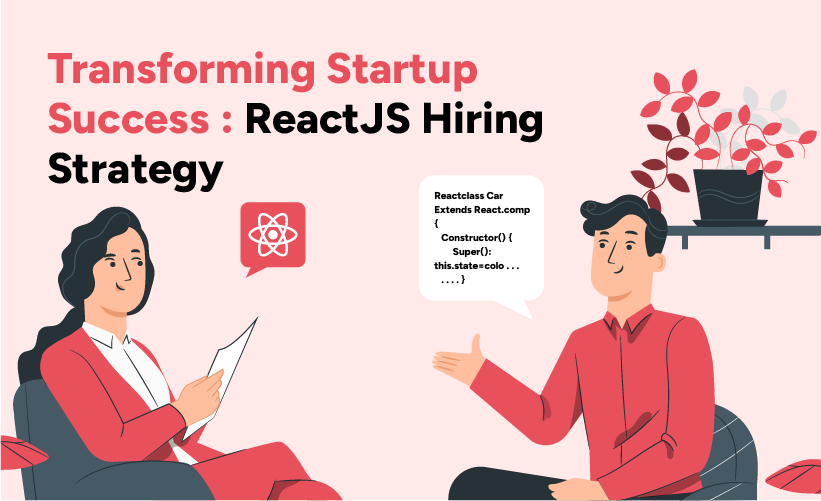
Startups, the pioneers of innovation, rely on skilled ReactJS developers to bring groundbreaking ideas to life. This guide is a crucial resource for startup founders navigating the complex process of hiring ReactJS talent. This process is essential for a startup since a skilled developer shapes its success.
1. Understanding the Role of a ReactJS Developer
As Per Stack Overflow’s insights, React is a widely used development framework among developers. A React developer builds Javascript-based applications for web or mobile platforms. These developers are specifically skilled in creating user interfaces for the applications.
A. Core Responsibilities
1. Building front-end elements:
A ReactJS developer constructs and enhances visual elements. These include images, icons, and buttons.
2. Develop code:
A ReactJS developer converts the wireframes into lines of code to build a user interface for various applications. These could be mobile or web applications. He also works with CSS selectors and HTML coding.
3. Application function optimization:
In addition to designing and testing, a ReactJS developer ensures cross-platform functionality. He verifies correct operation on diverse browsers and systems.
4. Testing:
As ReactJS developers are involved in every aspect of UI development, they must test the application for its functionality and efficiency.
B. Required Skills and Expertise
1. Strong understanding of ReactJS Fundamentals:
The candidate must deeply understand component-based architecture, state management, and virtual DOM. Proficiency in JSX and Javascript integration is also essential.
2. Proficiency in JavaScript (ES6+):
Proficiency in modern JavaScript (ES6 and beyond) is crucial for ReactJS to grasp asynchronous programming, promises, and callbacks.
3. Component Lifecycle Management:
Comprehending and effectively using React component lifecycles to optimize application performance and responsiveness.
4. State Management:
A strong familiarity with Redux or Context API for managing the state of complex applications.
5. Responsive Design and Styling:
Knowledge of CSS and its pre-processors (e.g., Sass or Less) for creating responsive and visually appealing user interfaces.
6. Routing:
Familiarity with React Router for seamless navigation within single-page applications.
7. RESTful API Integration:
Integration of front-end applications with back-end services through RESTful APIs.
8. Debugging and Performance Optimization:
Skillset in debugging React applications using browser developer tools and various techniques. Being capable of identifying and optimizing performance bottlenecks.
9. Version Control/Git:
Competence in using version control systems. Specifically, an understanding of Git in collaborative development and code versioning is desirable.
10. Testing:
A clear comprehension of Jest and Enzyme for writing unit tests for code reliability.
11. Continuous Integration/Continuous Deployment (CI/CD):
Competence in using version control systems. Specifically, an understanding of Git in collaborative development and code versioning is desirable.
12. Collaboration and Communication:
A ReactJS developer should communicate effectively and collaborate with cross-functional teams. He should also easily articulate technical concepts and foster a positive team culture.
2. Assessing Your Startup's Needs
Define the company requirements beforehand. It could be a small project, a mid-sized project, or a long-term goal. A well-defined objective gives the right direction.
A. Identifying Project Requirements
1. Scope and Complexity:
Define the project scope and complexity. Ensure it involves creating a single-page application, API integration, or managing a complex state.
2. Defining Tech Stack:
Determine and define the technology stack your project requires. Also, check the tech compatibility with existing tech resources you use within your startup.
3. Timeline:
Evaluate the timeline for successful project accomplishment. A clear timeline, along with the lags, is a great starting point.
B. Determining the Project Scope
1. Project lifecycle:
A ReactJS developer can manage the entire project or assist with specific tasks. It's crucial to define your project requirements clearly.
2. Cross-functional team collaboration:
Evaluate the collaboration between the ReactJS developer and other teams. Define the necessary level of teamwork for successful project achievements.
3. Engagement period:
Are you looking for a ReactJS developer for a short-term or a long-term engagement? This defines the tenure of the ReactJS developer in your company.
2. Assessing Your Startup's Needs
Define the company requirements beforehand. It could be a small project, a mid-sized project, or a long-term goal. A well-defined objective gives the right direction.
A. Identifying Project Requirements
1. Scope and Complexity:
Define the project scope and complexity. Ensure it involves creating a single-page application, API integration, or managing a complex state.
2. Defining Tech Stack:
Determine and define the technology stack your project requires. Also, check the tech compatibility with existing tech resources you use within your startup.
3. Timeline:
Evaluate the timeline for successful project accomplishment. A clear timeline, along with the lags, is a great starting point.
B. Determining the Project Scope
1. Project lifecycle:
A ReactJS developer can manage the entire project or assist with specific tasks. It's crucial to define your project requirements clearly.
2. Cross-functional team collaboration:
Evaluate the collaboration between the ReactJS developer and other teams. Define the necessary level of teamwork for successful project achievements.
3. Engagement period:
Are you looking for a ReactJS developer for a short-term or a long-term engagement? This defines the tenure of the ReactJS developer in your company.
C. List of necessary Technical and Soft Skills
1. Hard skills:
Emphasize heavily on ReactJS fundamentals expertise. Explore other technologies and verify if candidates possess these skills.
2. Soft skills and cultural fit:
Prioritize soft skills like collaboration, communication, and adaptability. Assess the developer's cultural fit within your startup. Ensure they bring these essential skills to the workplace.
3. Potential:
Evaluate the potential for the developer's growth within your startup. Can they adapt to evolving project requirements? Are they ready to take on additional responsibilities with your startup’s expansion?
3. Crafting a Compelling Job Description

To hire the correct ReactJS developer, it is necessary to define the job description correctly. Here are some guidelines to help you craft a compelling job description to reach the potential ReactJS developer.
A. Attracting Top Talent with an Engaging Description:
1. Clear and Concise Overview:
Offer a concise overview of the role, outlining the developer's responsibilities and the project’s impact. Emphasize unique aspects that distinguish your startup from others.
2. Showcase Exciting Projects:
Emphasize the projects in which the candidate will be involved. Discuss the innovative features or industry challenges that make these projects stimulating.
3. Emphasize Career Growth:
Highlight career development opportunities in your startup. It could be gaining expertise in new technologies or stepping into leadership roles. Emphasize the candidate's potential for professional growth.
4. Define the Impact:
Clarify the role's impact on startup success, emphasizing achievable benchmarks. Tell them how their contributions will align with long-term company goals.
5. Express Your Company Culture:
Describe the work environment, values, and collaborative spirit. Be transparent about expectations and the type of individuals who thrive in your organization.
6. Engaging Language and Tone:
Craft a job description with a tone that resonates with your target audience. Choose a conversational style that reflects the startup's personality. Always avoid complex language.
7. Benefits and Perks:
Highlight your startup's benefits package. Discuss flexible work, remote options, professional development opportunities, and wellness programs.
8. Incorporate Diversity and Inclusion Values:
Showcase your commitment to diversity and inclusion. Highlight initiatives that create an inclusive work environment. Emphasize your dedication to a diverse team.
B. Highlighting Company Culture and Mission
1. Highlight Your Core Values:
Emphasize the fundamental principles that guide your startup. It could be innovation, collaboration, or a commitment to excellence.
2. Talk about the Work Environment:
Discuss whether your startup fosters a fast-paced environment or flexible work culture. Be honest about the expectations for collaboration.
3. Share Success Stories:
Talk about successful projects, team accomplishments, or when your team overcame challenges.
4. Describe Team Dynamics:
Highlight your startup's teamwork, mutual support, and collaborative spirit. Showcase an inclusive environment where you value contributions and opinions.
5. Company’s Mission:
Communicate your startup's mission and vision. Illustrate how the ReactJS developer's role directly contributes to fulfilling this mission.
6. Encouragement to Community Engagement:
Showcase your startup's community involvement and social responsibility initiatives. Emphasize a commitment to diversity and inclusion. Developers are often drawn to companies that positively impact the community.
7. Offer Employee Testimonials:
Provide insights through testimonials from current employees for an authentic perspective. Let candidates envision themselves as part of your team.
8. Exploring Personal Growth:
Share how your startup fosters personal and professional growth. Mention mentorship programs and career advancement opportunities. Highlight options for continuous learning and development.
8. Interactive Company Culture Content:
Supplement the job description with multimedia content. This could include videos or social media links visually representing your startup's culture.
4. Navigating the Hiring Platforms:
A. Utilizing Job Boards and Platforms
In the digital age, job boards, and specialized platforms are crucial for connecting with talented ReactJS developers. They broadcast openings to a vast pool of potential candidates, significantly enhancing the chances of finding the right fit.
1. Selecting Appropriate Platforms:
Choose job boards and platforms that are well-regarded within the tech community. Platforms
like Stack Overflow Jobs, GitHub Jobs, and others provide a focused audience of skilled
ReactJS developers.
Our platform, Hyno, also offers a
pre-vetted developer pool to find the right candidate in less than two weeks.
2. Crafting an Engaging Job Listing:
Outline technical requirements, highlight unique aspects, such as exciting projects and vibrant company culture, and use engaging language to capture the attention of developers browsing multiple listings. You can also use Hyno’s job description template.
3. Optimizing for Search:
Many developers search for opportunities using specific keywords. Optimize your job listing for relevant terms. Make sure it is well-discoverable.
4. Leveraging Targeted Ads:
Consider investing in sponsored listings or targeted ads to increase the visibility of your job opening. This ensures that it reaches a larger and more relevant audience.
5. Engaging Actively in Discussions:
Discussion forums or community sections allow you to interact with developers directly.
6. Regularly Updating Listings:
Regularly update listings to reflect requirement changes, additional perks, or new projects. This demonstrates that your startup is dynamic and responsive.
7. Utilizing Analytics for Refinement:
Utilize analytics insights and metrics to refine your approach. Check the post metrics to understand the effectiveness of your job board strategy.
B. Engaging with Developer Communities
1. Participation in Online Forums and Communities:
Join popular online forums like Stack Overflow, relevant subreddits on Reddit, and Dev.to, to engage with the ReactJS developer community. You can also visit our developer community at Hyno to learn about highly skilled ReactJS developers.
2. Contributing to Open Source Projects:
Contributing to open-source projects showcases your startup's commitment to the developer community. Demonstrate technical prowess and foster interaction with like-minded developers.
3.Hosting Virtual Meetups or Webinars:
Organize virtual meetings focused on ReactJS or related technologies. This positions your startup as an authority and creates a platform for direct interaction with potential candidates.
4. Networking at Developer Conferences:
Participate in virtual and in-person developer conferences to connect with ReactJS developers. This lets you gain insights into industry trends and showcase your startup as an attractive workplace.
5. Building an Online Presence:
Establish a solid online presence through blogs, thought leadership, and relevant tech platforms. Engage via content and social media presence to capture the attention of the developer community.
6. Hosting Coding Challenges or Hackathons:
Organize coding challenges or hackathons that focus on ReactJS. This is a talent attraction strategy. Observe developers in action and assess their problem-solving skills.
7. Responding to Developer Queries:
Actively engage in discussions and respond to queries related to ReactJS or your startup's technology stack. This fosters a positive image within the developer community.
8. Building Relationships Over Time:
Consistent engagement and genuine participation establish your startup as a respected employer.
5. Screening and Shortlisting Candidates

A. Reviewing Resumes and Portfolios
1. Establish Clear Criteria:
Define clear criteria for the role. Identify the critical technical skills, experience levels, and other qualifications essential for success in the position.
2. Focus on Relevant Experience:
Prioritize relevant work experience in ReactJS development. Look for candidates who have worked on projects similar to your startup's needs.
3. Assess Technical Skills:
A strong ReactJS developer should be proficient in React fundamentals. This should include state management, component lifecycle, and other relevant technologies.
4. Examine Project Contributions:
Assess the developer's contributions to past projects. Look at their design, implementation, and problem-solving roles. Check their creativity and innovation in addressing challenges.
5. Evaluate Code Quality:
Review code samples or GitHub repositories if provided. Assess the code quality, adherence to best practices, and problem-solving approach.
6. Check for Continuous Learning:
Look for continuous learning and professional development indications. Developers who stay updated with the latest technologies are often valuable additions to your team.
7. Assess Soft Skills:
Effective communication, adaptability, and collaboration are crucial in a startup environment. Look for indications of these qualities.
8. Verify Educational Background:
Verify educational backgrounds and certifications. It provides a context for their understanding of software development.
9. Maintain Consistency in Evaluation:
Use a scoring system to assess each resume and portfolio objectively. Maintain fairness and transparency throughout the screening process.
B. Conducting Initial Technical Assessments
1. Define Clear Assessment Objectives:
Evaluating coding skills, problem-solving abilities, or ReactJS concept application. Having a well-defined purpose ensures a focused evaluation.
2. Select Appropriate Assessment Methods:
Select assessment methods aligned with the role's required skills, such as coding exercises, problem-solving scenarios, or hands-on projects—craft scenarios reflecting challenges in your startup environment.
3.Coding Exercises:
Incorporate coding exercises that assess the candidate's proficiency in ReactJS. Can they cover component creation, state management, and asynchronous operations management?
4. Problem-solving Scenarios:
Present ReactJS-based problem-solving scenarios, evaluating candidates' approaches, solution structure, and troubleshooting skills during development.
5. Time Management:
Assess a candidate’s time allocation and management capabilities. This provides insights into their efficiency and ability to work under strict time constraints.
6. Interactive Assessments:
Consider interactive assessments. This could be pair programming or collaborative coding sessions. The exercise shows a candidate’s collaboration, communication, and adaptability skills.
7. Provide Constructive Feedback:
Provide constructive feedback to candidates post-assessment, improving their understanding of areas for improvement. Positively reflect your startup's commitment to transparent hiring practices.
8. Adaptability to New Technologies:
Assess the candidate's adaptability to new technologies or tools. A developer's ability to quickly learn and adapt can become a valuable asset for a startup.
6. Technical Evaluation

A. Designing a Practical Coding Challenge
1. Align with Real-world Scenarios:
Create coding challenges similar to real-life projects to evaluate a developer's strengths in a specific environment.
2. Incorporate Industry Best Practices:
Evaluate a candidate's adherence to industry best practices in coding. Can they write clean, reusable, and efficient code?
3. Time Constraints:
Can the candidate work under time pressure? Can he/she maintain critical thinking and creative abilities with a smaller time window?
B. Conducting Technical Interviews
1. Interactive Coding Sessions:
Conduct interactive coding sessions to observe candidates' real-time coding skills. Ask clarifying questions and assess their independent thinking.
2. Problem-solving and Algorithmic Thinking:
Can the candidate break down a complex issue, build an algorithm, and optimize the code to achieve efficiency? Rate them according to these parameters.
3.ReactJS-Specific Questions:
Incorporate ReactJS-specific questions to assess candidates. Challenge them on context API, hooks, performance optimization, and state management.
4. Testing and Debugging Proficiency:
Evaluate a candidate's testing and debugging proficiency. Can they identify and resolve errors? Can they achieve and maintain code quality and project stability?
5. Assessing Previous Work:
Assess a candidate’s time allocation and management capabilities. This provides insights into their efficiency and ability to work under strict time constraints.
6. Collaborative Problem-solving:
Incorporate collaborative problem-solving scenarios to assess a candidate's communication of technical concepts. Also, examine their collaboration with interviewers and iterative refinement of solutions.
7. Adapting to Evolving Requirements:
Pose questions that assess a candidate's ability to adapt to evolving project requirements. Let them showcase flexibility in adjusting their approach based on changing needs.
C. Evaluating Problem-Solving Abilities
1. Critical Thinking Skills:
Evaluate candidates' critical thinking. Present scenarios that require them to analyze, prioritize, and strategize solutions to complex ReactJS development issues.
2. Algorithmic Problem-solving:
Include algorithmic problem-solving challenges. Evaluate a candidate's proficiency in developing efficient algorithms, considering time and space complexity factors.
3.Handling Edge Cases:
Pose questions about handling edge cases and unexpected scenarios. A strong ReactJS developer should anticipate potential issues and robust solutions.
4. Logical Reasoning:
Present problems that require candidates to approach challenges methodically. Let them demonstrate their ability to identify patterns, draw logical conclusions, and design effective solutions.
7. Assessing Cultural Fit

A. Importance of Company Culture
1. Emphasize Collaborative Culture:
Highlight the collaborative nature of your startup. Emphasize that you value every team member's contribution, which lets the team members thrive.
2. Showcase Innovative Projects:
Discuss the existing or upcoming innovative projects. Showcase how your developers embrace cutting-edge technologies and a culture of innovation.
B. Conducting Behavioral Interviews
1. Understand the STAR Method:
Learn the STAR method (Situation, Task, Action, Result) to elicit detailed responses from candidates. Encourage them to share specific examples from their experiences.
2. Identify Key Competencies:
Specify the essential competencies and success factors for the ReactJS developer role. Incorporate a mix of skills that align with your team dynamics.
3.Craft Behavioral Questions:
Develop behavioral questions to assess the identified competencies. Let them share how they demonstrated these competencies in their previous projects. You can find some behavioral questions here
4. Explore ReactJS-specific Scenarios:
Assess the candidate's experience with ReactJS development. Ask questions that delve into their contributions and outcomes in past ReactJS projects.
5. Probe for Problem-solving and Decision-making:
Probe candidates on their problem-solving and decision-making processes. Explore how they approach challenges, make decisions, and navigate complex scenarios.
6. Assess Communication Skills:
Evaluate how they communicate complex concepts to technical and non-technical stakeholders. Can they articulate ideas and share information effectively?
7. Team Collaboration:
Behavioral questions should reveal how candidates contribute to team dynamics and handle conflicts. Will they be able to collaborate effectively with diverse team members?
8. Evaluate Leadership Potential:
Assess their leadership potential. Check where candidates take the initiative or demonstrate mentorship. Do they have the strength to be a leader and lead a team?
9. Provide Ample Opportunity to Ask Questions:
Dedicate time for candidates to ask questions. Allow them to clarify doubts. Their questions will display their level of interest, preparation, and consideration.
B. Team Collaboration and Communication Skills
1. Team Collaboration Dynamics:
Ask candidates about their experience with collaboration in ReactJS development. Seek specific examples of their active contribution to a team project.
2. Handling Diverse Perspectives:
In a ReactJS development setting, it is crucial to understand how they navigate differences of opinion. A candidate must be capable of contributing to a harmonious team dynamic.
3.Communication Styles:
Effective communication is essential for conveying technical concepts to non-technical stakeholders. Do they have a clear and concise communication approach?
4. Adaptability in Team Settings:
ReactJS developers often work in cross-functional teams. Therefore, adaptability to different team structures and dynamics is crucial.
5. Conflict Resolution Skills:
In ReactJS development, challenges are inevitable. Check how candidates approach and resolve conflicts. This showcases their ability to uphold positive team dynamics.
6. Use of Collaboration Tools:
Assess candidates' familiarity with collaboration tools. These include version control systems, project management tools, and communication platforms.
7. Project Documentation and Knowledge Sharing:
Explore candidates' practices regarding project documentation and knowledge sharing within a team. Do they ensure their work is well-documented and accessible to team members for future reference?
Conclusion
In conclusion, strategically hiring a ReactJS developer for your startup involves a lot of
factors to consider. Hence, a detailed approach to the hiring process ensures finding
skilled developers who align with your startup's culture and contribute to its long-term
success.
If hiring a ReactJS developer, look into Hyno’s talent pool of pre-vetted developers. Hire a developer
for your startup in less than two weeks.
final thought

by Harsh Verma
final thought

